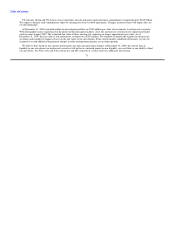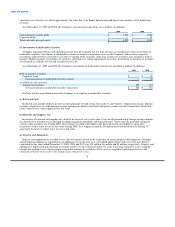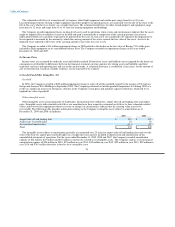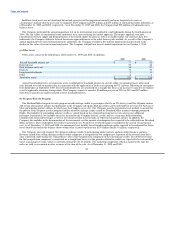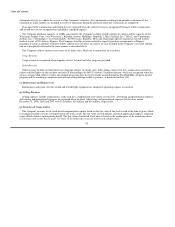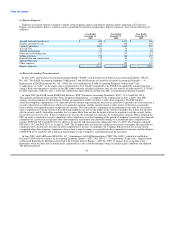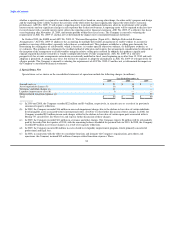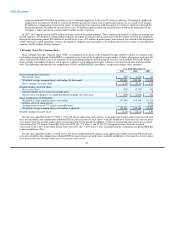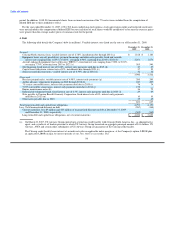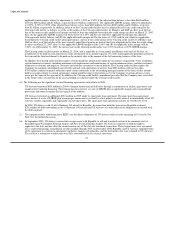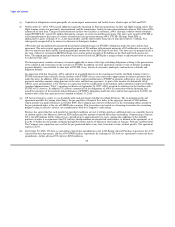US Airways 2009 Annual Report Download - page 83
Download and view the complete annual report
Please find page 83 of the 2009 US Airways annual report below. You can navigate through the pages in the report by either clicking on the pages listed below, or by using the keyword search tool below to find specific information within the annual report.
Table of Contents
the Company had $212 million and $240 million, respectively, in deferred revenue from the sale of mileage credits included in other
accrued expenses on its consolidated balance sheets.
(l) Derivative Instruments
The Company has from time to time utilized heating oil-based derivative instruments to hedge a portion of its exposure to jet fuel price
increases. These instruments consisted of no premium collars. All derivatives were marked to fair value on the balance sheet with
adjustments to fair value recorded in the income statement. The Company does not purchase or hold any derivative financial instruments
for trading purposes. Since the third quarter of 2008, the Company has not entered into any new fuel hedging transactions and, as of
December 31, 2009, the Company had no remaining outstanding fuel hedging contracts. As of December 31, 2008, the Company had
open fuel hedging instruments in place, which did not qualify for hedge accounting. Accordingly, the derivative hedging instruments
were recorded as an asset or liability on the consolidated balance sheets at fair value and any changes in fair value were recorded as gains
or losses on fuel hedging instruments, net in operating expenses in the accompanying consolidated statements of operations in the period
of change. See Note 6(a) for additional information on the Company's fuel hedging instruments.
(m) Deferred Gains and Credits, Net
In 2005, the Company's co-branded credit card provider, Barclays Bank Delaware, formerly Juniper Bank, paid AWA $150 million in
bonuses, consisting of a $20 million bonus pursuant to AWA's original credit card agreement with Juniper and a $130 million bonus
following the effectiveness of the merger, subject to certain conditions.
In the event Barclays, at its option, terminates the amended agreement prior to March 31, 2013 due to the Company's breach of its
obligations under the amended credit card agreement, or upon the occurrence of certain other events, then the Company must repay a
portion of the bonus, which declines monthly according to a formula. The Company will have no obligation to repay any portion of the
bonus payments after March 31, 2013.
At the time of payment, the entire $150 million was recorded as deferred revenue. The Company began recognizing revenue from the
bonus payments on April 1, 2009. The revenue from the bonus payments will be recognized on a straight-line basis through March 31,
2017, the expiration date of the amended Barclays co-branded credit card agreement.
In connection with fresh-start reporting and purchase accounting for US Airways in 2005 and fresh-start reporting for AWA upon
emergence from bankruptcy in 1994, aircraft operating leases were adjusted to fair value and deferred credits were established in the
accompanying consolidated balance sheets, which represented the net present value of the difference between the stated lease rates and
the fair market rates. These deferred credits are amortized on a straight-line basis as a reduction in rent expense over the applicable lease
periods. At December 31, 2009 and 2008, the unamortized balance of the deferred credits was $74 million and $93 million, respectively.
The Company expects to amortize $13 million in 2010, $9 million in 2011, $9 million in 2012, $7 million in 2013, $6 million in 2014 and
$30 million thereafter to aircraft rent expense related to these leasehold interests.
(n) Revenue Recognition
Passenger Revenue
Passenger revenue is recognized when transportation is provided. Ticket sales for transportation that has not yet been provided are
initially recorded as air traffic liability on the consolidated balance sheets. The air traffic liability represents tickets sold for future travel
dates and estimated future refunds and exchanges of tickets sold for past travel dates. The majority of tickets sold are nonrefundable. A
small percentage of tickets, some of which are partially used tickets, expire unused. Due to complex pricing structures, refund and
exchange policies, and interline agreements with other airlines, certain amounts are recognized in revenue using estimates regarding both
the timing of the revenue recognition and the amount of revenue to be recognized. These estimates are generally based on the analysis of
the Company's historical data. The Company and members of the airline industry have consistently applied this accounting method to
estimate revenue from forfeited tickets at the date travel was to be provided. Estimated future refunds and exchanges included in the air
traffic liability are routinely evaluated based on
81


